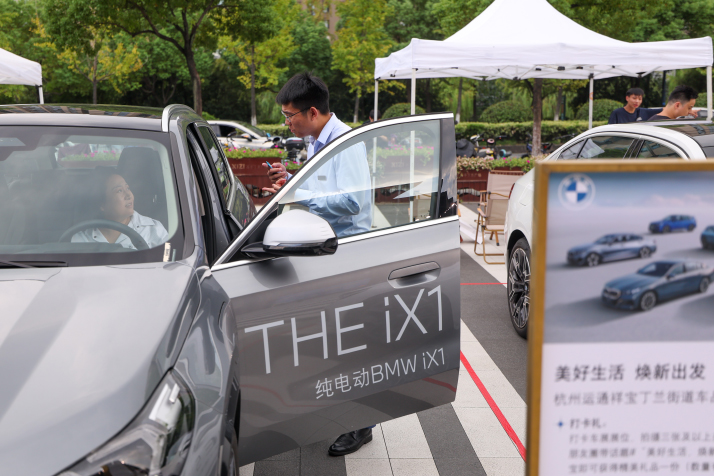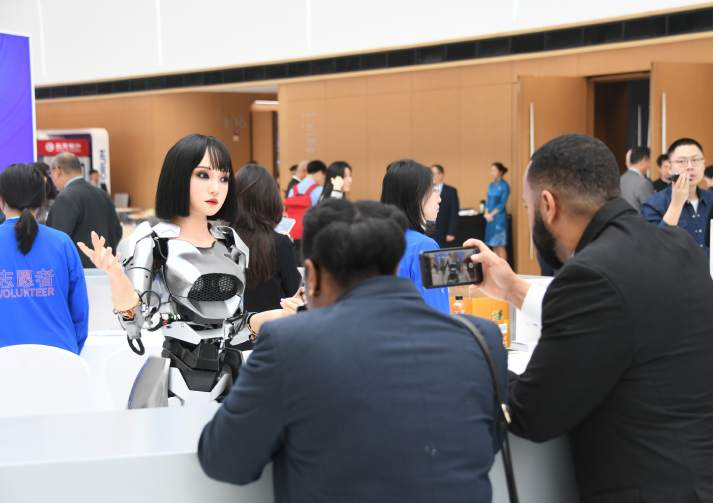| China |
| Local Two Sessions set the course for development | |
|
|
 A salesperson (right) introduces an electric vehicle to a customer at a consumer goods trade-in exhibition on September 27, 2024 (XINHUA)
The annual local Two Sessions, one session of the people's congress and one of the committee of the Chinese People's Political Consultative Conference (CPPCC) in each provincial-level region, serve as a crucial window for observing the economic and social development of various regions. Since mid-to-late January, provincial-level Two Sessions have been convened intensively, unveiling the blueprint for local economic and social development this year. By January 19, 20 province-level regions had concluded their local Two Sessions and announced their economic growth targets for 2025. The provincial-level Two Sessions are typically held in January or February. During these meetings, participants review regional economic and social development in the previous year and formulate plans for the upcoming year. Subsequently, in March, delegates from the regions to the National People's Congress (NPC) and members of the CPPCC National Committee—China's top legislature and top political advisory body respectively—convene for the national-level Two Sessions. Most regions have established growth targets of around 5-5.5 percent. However, Hainan and Hubei provinces, Inner Mongolia Autonomous Region, and Chongqing Municipality have set more ambitious targets of approximately 6 percent or higher, reflecting confidence in their future economic trajectories. Zhang Yiqun, Deputy Director of the China Special Committee on Budget Performance under the Society of Public Finance of China, told the Securities Daily newspaper that many regions have set economic growth targets exceeding 5 percent this year. This is supported by the solid foundation of the 5-percent national GDP growth rate in 2024, which has reinforced a positive macroeconomic trend. This year is the final year of the 14th Five-Year Plan (2021-25) and a critical period for solidifying the current economic recovery. Information released from the local Two Sessions held so far indicates a strong focus on stimulating consumption, leveraging technological innovation to develop new quality productive forces, and enhancing business environments. The term "new quality productive forces" refers to advanced productivity that features high technology, high efficiency and high quality, and comes in line with the new development philosophy underscoring innovative, coordinated, green, open and inclusive development for all.  A humanoid robot welcomes guests at the reception desk of the Zhongguancun Forum in Beijing on April 25, 2024 (XINHUA)
Boosting consumption At the Central Economic Work Conference in December 2024, "vigorously boosting consumption, improving investment efficiency and comprehensively expanding domestic demand" were prioritized as key tasks for the upcoming year. This emphasis on expanding domestic demand is also reflected in this year's local government work reports. For instance, Shanghai has identified dynamically promoting consumption as a central focus for 2025. The municipal government work report outlines plans to host major consumption-boosting events, including the Shanghai Shopping Festival (also known as the Double Five Shopping Festival), featuring promotions, discounts and coupons from shopping malls, businesses and financial institutions both online and offline; and the Shanghai Summer International Consumption Season, showcasing concerts, music festivals, art performances, major exhibitions and sporting events. The report also emphasizes accelerating the development of new business models such as livestreaming and recreational vehicle camping, as well as promoting the coordinated growth of commerce, tourism, culture, sports and exhibitions. Fujian Province has articulated a multi-pronged approach to stimulate consumption. This includes actively developing the "debut economy" and the "silver economy," which surrounds products and services for the elderly, along with building more smart commercial districts and distinctive pedestrian streets. The "debut economy" refers to a type of real economy measured by the launch of leading industrial and fashion brands that establish their first store in a specific location. This also includes traditional brands launching flagship or experiential stores under innovative models. It is undeniable that current efforts to promote consumption still face challenges, including insufficient consumer confidence and weak effective demand. Liu Chunsheng, an associate professor of economics at the Central University of Finance and Economics, told China City News newspaper that it is necessary to further tap into consumption potential. Simultaneously, consumer rights protection should be strengthened to foster a reliable consumption environment. Furthermore, consumption and industry should be upgraded in tandem, leveraging consumption to drive industrial upgrades and vice versa. Wang Peng, an associate researcher of public administration at the Beijing Academy of Social Sciences, also told China City News that income is the foundation of consumption, and therefore people's disposable income should be increased. Improving consumption infrastructure enhances convenience, requiring better commercial facilities and enhanced logistics and distribution efficiency. Optimizing supply is vital to meeting diverse consumer needs, thus increasing the availability of high-quality goods and services is essential. New growth drivers In this year's local Two Sessions, the term "new quality productive forces" has become a recurring theme. Local government work reports have produced roadmaps for accelerating the cultivation of these new productive forces, aiming to leverage technological innovation to inject new momentum into economic development. Shanghai's government work report emphasizes enhancing its capacity for technological innovation. It aims to strengthen research in strategic frontier fields such as cell and gene therapy (cell therapy involves the transfer of intact and living cells to a patient to treat a disease while gene therapy aims to fix a faulty gene or replace it with a healthy gene to cure disease or make the body better able to fight disease), brain-computer interfaces (devices that interpret brain activity and transmit signals to external software, enabling users to control devices with thought), and fusion energy (energy created by joining atomic nuclei together). Ming Ming, chief economist at CITIC Securities, told Cnr.cn, the official website of China National Radio, that various regions are exploring cutting-edge technologies such as artificial intelligence, biotechnology, and new energy to transcend traditional development models and provide new engines for economic growth. Future industries, referring to technologically advanced, emerging sectors such as quantum communication and nuclear fusion, are considered pivotal for developing new quality productive forces. Various regions are actively promoting the development of future industries, proposing supportive measures in policy and talent. For example, Beijing proposed in its government work report the cultivation of future industries, with a focus on nurturing 20 sectors including humanoid robots, commercial aerospace, bio-manufacturing and new materials. A better environment Optimizing the business environment is another area of emphasis in this year's local Two Sessions. Zhejiang Province will initiate a special campaign to standardize law enforcement involving enterprises. This initiative aims to resolutely prevent illegal cross-regional enforcement and profit-driven enforcement, thereby effectively safeguarding the legitimate rights and interests of private businesses and entrepreneurs. Experts say while considerable progress has been made in creating a sound business environment after years of reform, a gap remains between these achievements and the expectations of private enterprises. Song Xiangqing, Vice President of the Commerce Economy Association of China, told China City News that to optimize the business environment, local governments should prioritize assistance over interference, transform their service models, and establish "fast channels" for serving businesses and "green channels" for resolving issues. Wang suggested that local governments further optimize the talent development environment and attract and retain outstanding talent by refining talent recruitment and training programs and by improving compensation. Concurrently, strengthening the social credit system, establishing and improving credit information sharing mechanisms, increasing penalties for dishonest behavior and creating a robust social credit environment are vital. BR (Print Edition Title: Regional Agendas) Copyedited by G.P. Wilson Comments to jijing@cicgamericas.com |
|
||||||||||||||||||||||||||||||
|
